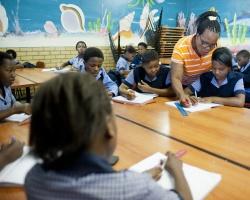Students Can Give Township Children Hope for the Future
Flocks of chatting, laughing children in navy and baby-blue uniforms are still swarming onto school grounds at 8:15. Class is supposed to start at 8—made all too clear by the school bell’s continuous blaring.
Still, Mzamomhle Primary School in Philippi is like many schools in Cape Town’s townships—understaffed, underfunded and under-resourced—so class doesn’t always start on time, and teachers don’t usually take roll—that is, if the teachers have a lesson planned or show up at all.
Education is vital to these young lives. Without it, these children have little hope of escaping the township lifestyle.
“(Education) is important because it’s part of my right,” said Olwethu, a 12-year-old girl in the seventh grade at Mzamomhle. “Because when I grow up, I want to be something, and you cannot be something in life if you didn’t study.”
Olwethu really believes that. In true middle-school fashion, she has “education is my right” written on the side of her backpack in White Out. She lives in a tin shack in Philippi with her mom and younger sister, but she dreams of one day living in a big house away from the township.
South African townships such as Philippi are poor neighborhoods populated by black (in Cape Town, mainly Xhosas), colored (a non-offensive South African term for mixed-race people) and Asian people; and are one of the remnants of South Africa’s former apartheid policy of racial segregation.
Townships consist of government-built concrete houses or squatter camps of makeshift tin and wood homes. These communities typically are riddled with socioeconomic and cultural issues such as unemployment, lack of education, crime, abuse, rape, HIV/AIDS, children without one or either parent, alcoholism and drugs.
“I want to live somewhere where I will have peace and know I will have a better life,” Olwethu said. “There are so many crimes here—some people kill people, and they do so many bad things such as raping children and stealing children.”
Olwethu’s 35-year-old mother, Lindiwe, fears for her daughters’ safety. She worries about their lives in Philippi, where tsotsi (robbers), violence, alcoholism and rape are rampant. She’s especially worried about the communal restrooms just behind her house, where people dispose of waste and dirty water into a large drain. She fears her daughters will contract diseases such as tuberculosis. She also has to keep an eye on her children when they go outside to play, because the long rows of tin shacks have no yards and are located right beside a main road.
Lindiwe hopes with a good education her daughters will have a chance for a better life than she has. She never finished school, and without matriculating—graduating high school—you can’t get a good job, she said.
“I don’t want to see Olwethu struggling like me; I don’t want to see Olwethu working as a domestic worker like me,” Lindiwe said. “That’s why I want Olwethu to go to school.”
Working only two days a week, Lindiwe can’t adequately support her two children, so she receives a child-support grant from the government. That way, Lindiwe is able to provide for her daughters and send them to school.
However, not all parents are able to work to provide for their children. Kholeka, 43, no longer is able to work because of a crippling train accident where one foot was cut off, her other foot maimed and both arms broken so badly they now are reinforced with metal rods, drastically limiting her mobility.
Because her children’s father is in prison for murder, her 14-year-old son, also named Olwethu (a popular name for South African children), must do most of the work around the house. He has had to step up and take responsibility in his family and has learned much about responsibility and a Christian lifestyle from a Christian after-school boys club he participated in while at Mzamomhle. Kholeka said Olwethu and the boys have learned how to behave as young men and that “the future is there for them, and they can be confident they will reach that.”
As a mother, Kholeka saw a difference in her son after he participated in the boys club. He was interested in the Bible verses he was learning; he wanted to go to church, so he stepped up and helped his family and others more.
“Olwethu is not the same Owlethu he was before,” she said.
Lindiwe’s daughter, Olwethu, also participates in a Christian after-school girls club at Mzamomhle and recently accepted Christ.
“My daughter always talks about Jesus, and she always talks and tells her friend about (Him),” Lindiwe said. “I am very, very proud of Olwethu.”
Olwethu attributes who she is today to her after-school club teachers.
“They gave me so many courages to carry on with life and love Jesus, as He forgave me of my sins,” she said. “So that’s how I live.”
To find out how one student’s life can make a difference in one school like Mzamomhle or one child’s life, visit OneLifeMatters.org.




